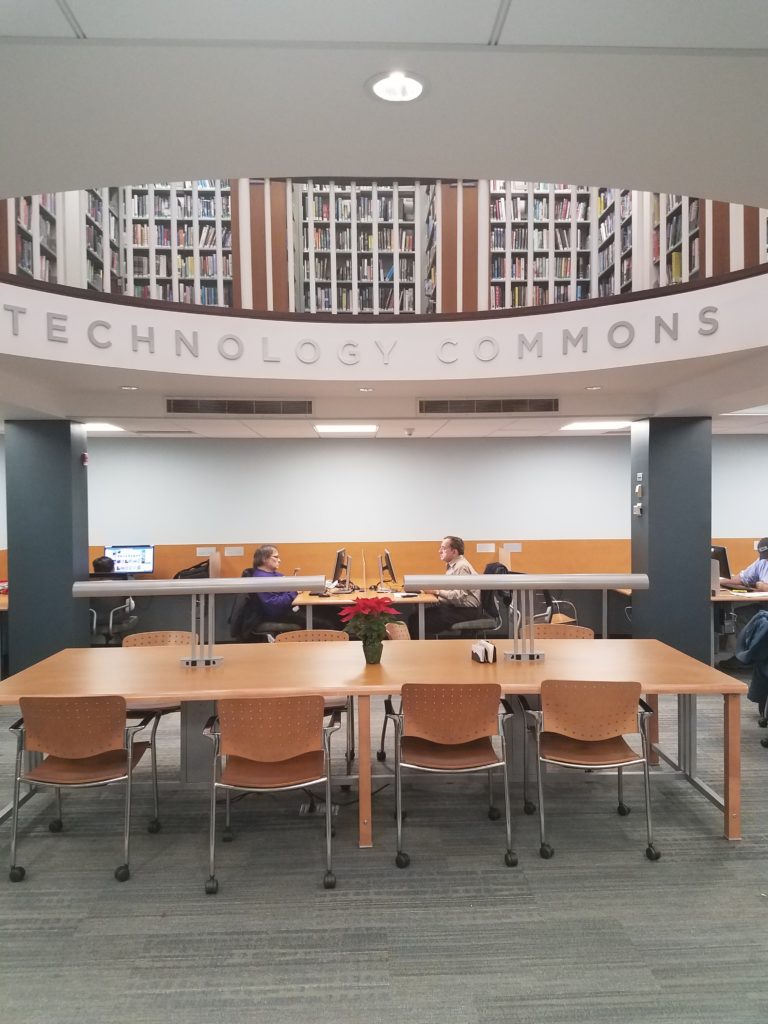Despite having consistently been a resident of New Rochelle, I have had a long-lasting connection with the nearby Larchmont Public Library. As a senior in high school I volunteered there, but quite a bit has changed both physically and technologically since I was last there on a regular basis. Extensive renovations were made in 2016.
The circulation desk is straight ahead as you walk in. Beyond that is the newly added and beautifully constructed Technology Commons, an open space with computers and tables. This serves as an excellent location for such a center. It is in close proximity to the circulation desk which always has at least one person there to assist patrons. I went on a Sunday, which usually is a relatively quiet day and most of the librarians are not there. Nonetheless, there was one man there who had quite a few patrons approach him for technological assistance. He maintained his affable demeanor throughout his exchanges with the patrons despite having quite a few people approach him. One patron’s issue seemed to be persistent and he returned repeatedly to the librarian for help. I did not detect any sense of frustration from the librarian despite the patron getting rather flustered. The librarian simply set him up at a different computer and the issue seemed to have been resolved.
Surrounding the Technology Center are enclosed areas designed for private tutoring sessions. Overlooking the Technology Center is a balcony area which hosts the adult fiction books. On the floor below is the adult non-fiction section. There is a diminutive art gallery (the Oresman Gallery) on the way to the Burchell Children’s Room which was completed in 2010. For a small public library which only has 100,00 items, there are many services which are offered.
Slightly unusual for a public library of its size, there is quite a lot of French items. The Children’s Library has an entire section of French books and there are an abundance of French options in the adult sections as well. There is a regular French/English story time offered on Sundays. Larchmont has historically had a large number of French speaking residents. The Lycee Franco-Americain de New York is right next door to the library. It is clear that the library has this community in mind when developing the collection and organizing the programming.
The library has been wheelchair accessible since 1995, although this is possibly an area where there can be room for improvement. On the bottom floor, there is a wheelchair lift next to the staircase so as to accommodate the physically handicapped. However, it can be a bit of a pain to use. In order to operate the lift, one needs to have a key which must be obtained from the circulation desk. It would probably be simpler to have a ramp instead.
Another issue I overheard someone complain about was that the book drop was underneath the computer kiosk for searching the catalog. It is possibly a slight inconvenience and perhaps not an intuitive place for it to be, but to be honest, I found the complaint to be rather petty. Still, I suppose it is something worth considering when creating an information space.
I was also surprised by the number of research resources that are provided at the Larchmont Public Library. There are four full-time reference librarians and one part-time reference librarian (she actually used to be the assistant director of the library and my supervisor). The reference librarians are not there on Sundays, but there is permanent use of the online resources, which include materials on Arts and Literature, Biographies, Genealogy, Health and Science, History, Business and Law, Social Science, Newspapers, Serials etc. I was astounded by how much this small public library has to offer.
